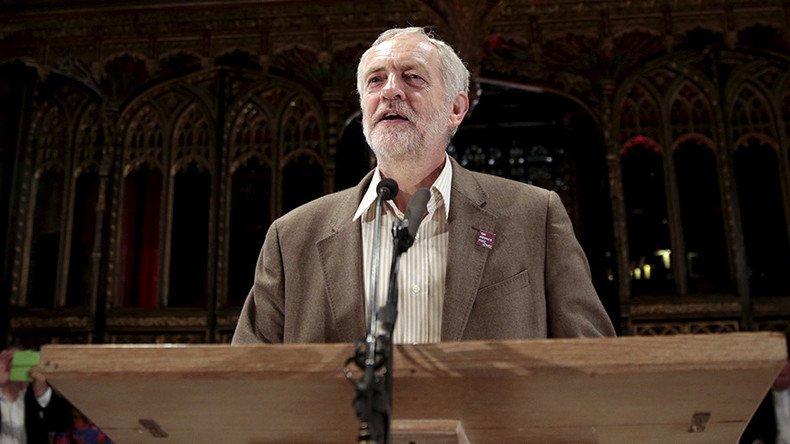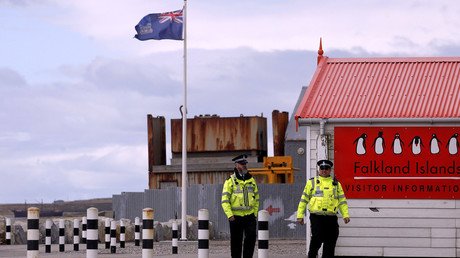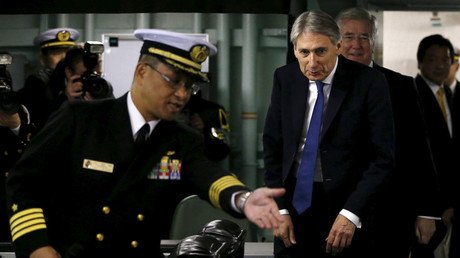‘He’s one of ours’: Argentina praises UK’s Corbyn for power-sharing idea in disputed Falklands

The leader of the UK opposition Jeremy Corbyn has risked creating another rift in the Labour Party by proposing that a power-sharing agreement with Argentina should be adopted in regard to the disputed Falkland Islands, reports state.
Already at odds with factions of Labour over whether to renew Britain’s nuclear deterrent Trident, Corbyn now risks the ire not only of large sections of the UK public, but also members of his own party by saying that Britain should consider a Northern Ireland-style power-sharing deal for the Falkland Islands (or ‘Malvinas,’ as Argentina refers to the tiny South Atlantic archipelago).
The Argentinian ambassador to London, Alicia Castro, said in an interview published on the diplomatic mission’s website that the Labour leader had visited the embassy in the British capital and had talked about the issue, adding that he “shares our concerns.”
Castro, who is preparing to step down as Argentina’s ambassador to the UK, described Corbyn as being “one of ours,” while the meeting was “friendly and humorous,” the Press Association reported.
“He is saying that dialogue [is] possible and that attitudes are beginning to change, that what was achieved in Northern Ireland can be achieved also here,” Castro said.
“His decisive leadership can guide the British public opinion to promote dialogue between the governments of the United Kingdom and Argentina,” she added.
While Corbyn believes that those living on the islands – the vast majority of whom are staunchly pro-British – should have a very big say in discussions regarding their future, he does not believe they should be able to completely dictate any future policy.
Dear @jeremycorbyn I know electoral politics doesn't really interest you but here's the 2013 Falklands Referendum. pic.twitter.com/7sm8vwmtGU
— Bristol Red (@BristolRed) January 24, 2016The shadow foreign secretary, Hilary Benn, has already said he is deeply against any plans to give Argentina any say in the running of the Falklands.
“The Labour Party policy remains that the people of the Falkland Islands have the right to determine their own future,” a spokesman told the Sunday Telegraph when asked if Benn would support a power-sharing deal.
“We are committed to upholding the right of the Falkland Islanders to self-determination, including by ensuring the defense of the islands. Hilary is not aware of any proposals for what you have called a ‘power-sharing deal’ in regard to the Falklands,” he added.
Corbyn suggested on January 17 that efforts be made towards a “reasonable accommodation” on the South Atlantic islands, over which Britain and Argentina fought a short war in 1982.
Corbyn told the BBC: “There has to be a discussion about how we can bring about some reasonable accommodation with Argentina.
“It seems to me ridiculous that in the 21st century we could get into some enormous conflict with Argentina about the islands just off it,” he added.
His comments brought a shark rebuke from British Prime Minister David Cameron following a meeting with Argentina’s President Mauricio Macri at the Davos Economic Forum in Switzerland on January 21.
“The prime minister was clear that our position remained the same and that the recent referendum was absolutely clear on the islanders' wish to remain British,” Cameron’s spokesman said.
the Falklands. If the Argies just pretended to be a multinational corporation Osborne would sell the islands 2 them for a fiver 2morrow
— Lord Snoutintrough (@Rowland72James) January 24, 2016Corbyn’s comments regarding the issue of the Falklands come as he is already facing a backlash from sections of his own party regarding whether to renew the Trident nuclear deterrent.
The Labour leader, who is an anti-war campaigner, believes the cost of Trident – put at £167 billion ($234 billion) over 32 years – could be better spent elsewhere, especially with the ruling Conservative government cutting spending in crucial areas such as the health service. However, opponents say that the UK cannot unilaterally disarm in an increasingly hostile world.
In April, a group of British exploration companies found oil and gas in an area north of the Falkland Islands. Two months later, an Argentinian judge ordered the authorities to seize the assets of five companies drilling for oil in the Falklands worth $156 million.
Argentine court orders seizure of Falklands/Malvinas ‘illegal’ oil drillers’ assets http://t.co/ppP7gdtZv1pic.twitter.com/YkvAw5tz51
— RT (@RT_com) June 28, 2015Argentina has claimed the drilling is illegal, and the Argentinian embassy in London issued a statement in November 2013 that British oil executives face up to 15 years in prison and fines equivalent to 1.5 million barrels of oil, as well as the confiscation of equipment and any hydrocarbons extracted.
Britain has been looking to boost its defenses in the Falklands and London ordered a £46 million ($65 million) Giraffe mobile air defense radar system in August, fearing a possible attack from Argentina. Defence Secretary Michael Fallon also pledged to spend £180 million ($280 million) over the next 10 years on upgrading island defenses.













